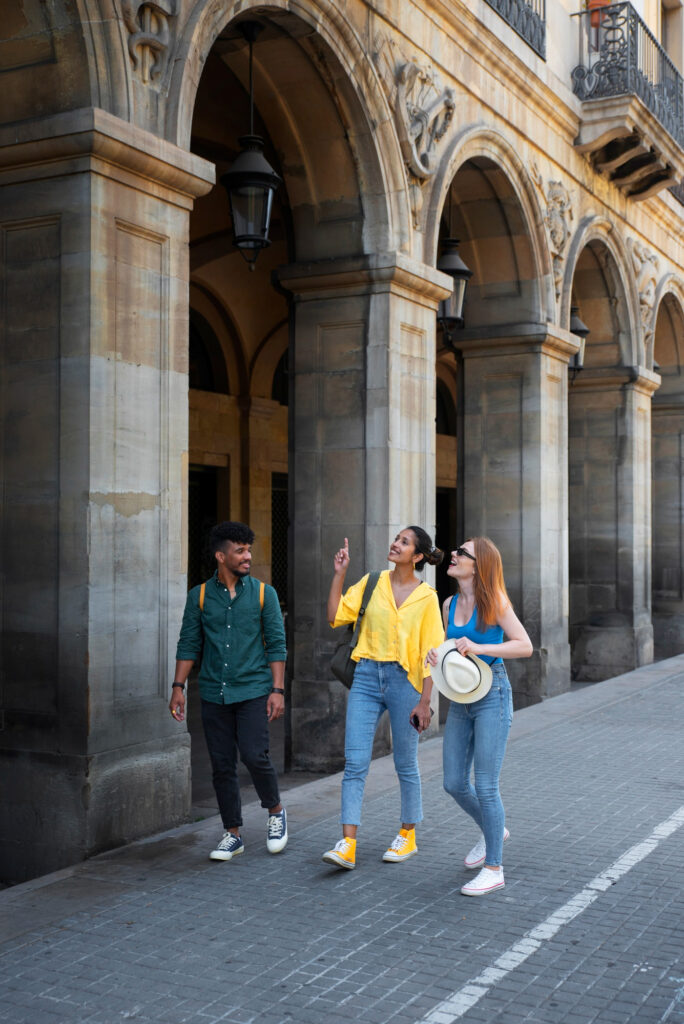Living in Malta
Malta, a small yet vibrant island nation in the Mediterranean, is known for its rich history, stunning landscapes, and high quality of life. Whether you’re planning to study, work, or relocate permanently, Malta offers a unique blend of modern European amenities and traditional island charm. This guide explores everything you need to know about living in Malta, from its economy and cost of living to its education system and lifestyle.

1. Geographical & Climatic Overview
📍 Strategic Location
Malta is located in the heart of the Mediterranean Sea, south of Italy and north of Africa. Its central position makes it a gateway between Europe, Africa, and the Middle East.
🌞 Mediterranean Climate
- Long, hot summers (June – September) with temperatures reaching 35°C+.
- Mild winters (December – February) with temperatures rarely dropping below 10°C.
- Over 300 days of sunshine per year, making it one of the sunniest places in Europe.
2. Work & Business Opportunities
Malta has a thriving economy, driven by key sectors such as iGaming, tourism, finance, and IT. It offers attractive tax benefits for businesses and entrepreneurs.
🏢 Job Market
- Growing demand for English-speaking professionals in customer service, finance, IT, and healthcare.
- Competitive salaries: Entry-level jobs (€18,000-€25,000/year), while skilled professionals can earn €35,000+ per year.
- Work permits required for non-EU nationals.
💼 Business & Investment
- Corporate tax rate: 35%, but businesses can benefit from effective tax refunds.
- Start-up ecosystem growing rapidly with government incentives and EU funding.
- Tourism & Hospitality sector provides seasonal and full-time job opportunities.
3. Cost of Living in Malta
While Malta is generally more affordable than many Western European countries, costs can vary depending on lifestyle choices.
💰 Accommodation Costs
- Shared Apartment: €300-€600/month per person
- Private Apartment (1-bedroom): €800-€1,500/month
- Luxury Apartment (Sea view or central locations): €1,500-€3,000/month
🍽 Food & Dining
- Grocery shopping (monthly): €250-€400
- Meal at an inexpensive restaurant: €12-€20
- Fine dining (per person): €40-€80
🚍 Transportation
- Public Transport (Bus Card – Tallinja): €26/month for students, €39/month for adults
- Taxi (Bolt / Uber / eCabs): €10-€20 per ride within city limits
- Car Rental: Starting from €15/day
📡 Utilities & Internet
- Electricity, Water, Heating (for an 85m² apartment): €80-€150/month
- Internet & Mobile Plans: €25-€40/month
4. Culture & Lifestyle
Malta boasts a rich cultural heritage influenced by Italian, British, and Arabic traditions.
🏛 Historical & Cultural Attractions
- Valletta – A UNESCO World Heritage Site with stunning architecture.
- Mdina – The “Silent City,” a beautifully preserved medieval town.
- Megalithic Temples – Older than the Egyptian pyramids!
🎭 Events & Festivals
- Carnival (February): Colorful parades and celebrations.
- Isle of MTV (Summer): One of Europe’s biggest free music festivals.
- Village Festas (Summer): Local celebrations with fireworks and processions.
🌊 Outdoor Activities
- Beaches & Diving: Malta is home to some of the best dive sites in the Mediterranean.
- Hiking & Nature Walks: Stunning coastal trails and countryside views.
- Water Sports: Sailing, jet skiing, and snorkeling are popular activities.

5. Education System & Language Schools
Malta is a hub for international students, with its mix of public universities, private institutions, and language schools.
🎓 Higher Education
- University of Malta – The oldest university in Malta, offering degrees in various fields.
- MCAST (Malta College of Arts, Science & Technology) – Vocational and technical education center.
- Private Institutions – Specializing in finance, business, and IT.
🗣 English Language Schools
- Malta is one of Europe’s top destinations for English learners.
- Many accredited language schools provide General English, Business English, and Exam Preparation courses.
6. Healthcare & Medical Services
Malta has a high-standard healthcare system, ranked among the best in Europe.
🏥 Public & Private Healthcare
- Public healthcare is free for Maltese citizens and EU nationals under the EHIC system.
- Private healthcare is available, with faster services and English-speaking doctors.
💊 Health Insurance
- Recommended for non-EU residents and those seeking private medical care.
- Monthly premiums range from €40-€150, depending on coverage.
7. Residency & Visa Requirements
🛂 EU Citizens
- Can live and work in Malta without restrictions.
- Must apply for a residence permit after three months.
🌎 Non-EU Citizens
- Require a visa and work permit for employment.
- Malta Permanent Residence Program (MPRP) – A residency-by-investment program.
- Student Visas required for non-EU students enrolling in long-term courses.
8. Transportation & Getting Around
🚍 Public Transport
- The bus system is affordable but can be crowded during peak hours.
- A monthly bus pass costs €26 (students), €39 (adults).
🚗 Car Rentals & Driving
- Driving is on the left side of the road (British influence).
- Parking in cities like Valletta and Sliema can be challenging.
🚤 Ferries & Boats
- Regular ferries connect Malta, Gozo, and Comino.
- Water taxis are a fast and scenic way to travel between Valletta and Sliema.
9. Safety & Quality of Life
🔹 Safe Environment – Malta is one of the safest countries in Europe with a low crime rate.
🔹 Friendly Community – Locals are welcoming, and English is widely spoken.
🔹 Multicultural Atmosphere – Many expats, international students, and digital nomads choose Malta as their home.
💡 Overall, Malta offers a fantastic balance between work, study, and leisure, making it an attractive destination for students, professionals, and travelers.
🚀 Thinking about moving to Malta? Whether you’re coming to study, work, or explore, Malta has something for everyone!